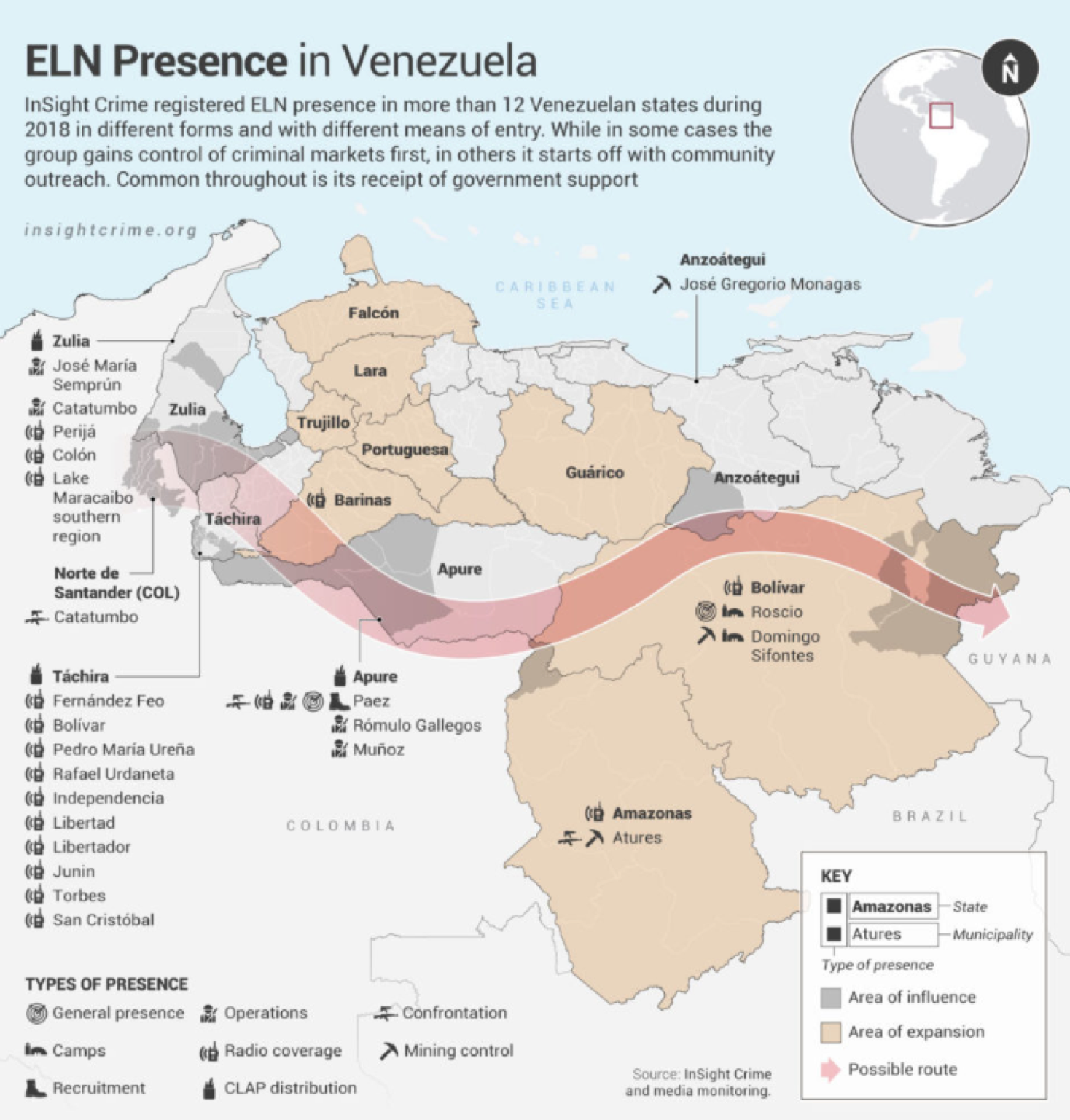





|
Tweet
|
|
|
The decision of Iván Márquez, Jesús Santrich, and El Paisa, leaders of the Revolutionary Armed Forces of Colombia (FARC-EP), to return to the armed struggle against a democratic state like Colombia is an excuse to return to their past illicit activities such as drugtrafficking and illegal gold mining. Another motive was the possibility of joining the irregular or paramilitary forces that support Nicolás Maduro and Venezuela's actual mafia state. With the FARC-EP now making money again from illegal businesses, Maduro will also benefit. In fact, Maduro will be able to ameliorate/compensate for the losses caused by the United States sanctions on Venezuelan state oil and mining companies, PDVSA and Minerven, with funding coming from his dealings with FARC-EP. As described in an interview with the Hill in May, Navy Admiral Craig Faller, head of the United States Southern Command, indicated, "illicit narco trafficking through Venezuela is up to some 40%". FARC-EP leaders Márquez and Santrich announced the decision two days after their visit to Cuba. According to former Colombian President Andrés Pastrana, they flew to La Habana in Maduro's private plane with the serial YV3016, in the company of Adán Chávez, Hugo Chávez's brother. So, one could argue that the Cuban regime is behind the FARC-EP return to the armed struggle. Since the uprising attempt ("Operation Freedom") on April 30 in Venezuela and the appointment of new Military Chiefs by Maduro in July, Diosdado Cabello has increased his power of influence within the Bolivarian regime. Therefore, Cuban leaders saw the need to prop up Maduro. In Venezuela, the differences that Diosdado Cabello has with the regime in Cuba and vice versa are vox populi. Therefore, not being able to have easy access to the Venezuelan military, Cuban leaders seek to influence the irregular forces that are present in half of Venezuela's territory. In fact, it has been documented that 13 of the 24 states in the country have a presence of the National Liberation Army (ELN), with the most significant presence on the border with Colombia. To consolidate this presence, the FARC-EP announced the establishment of an alliance with the ELN in its second statement. Telesur, a network based in Caracas and sponsored mainly by the Maduro regime, has been the platform used by the FARC-EP to launch its return to old business, according to Venezuelan journalist Alberto Federico Ravell. 
Source: https://www.insightcrime.org/wp-content/uploads/2018/11/01-11-2018_Mapa-presencia-del-ELN-en-Venezuela_Insight-Crime_Map_Ingl%C3%A9s-1-967x1024.jpg In Venezuela, Juan Guaidó keeps fighting to restore democracy with support from the 59 governments that support him, primarily the US. On the other hand, Maduro and the governments of Cuba, Russia and to a lesser extent Iran, Turkey, most Caribbean Community countries, and China struggle to defeat the "American empire". During the 40 years of the Cold War, the United States and the former Soviet Union fought proxy wars across the planet. Cuba intervened with regular forces in the war in Algeria-Morocco (1963), Congo (1965), Syria (1973-1974), Angola (1975-1991), Ethiopia (1975-1988) and Nicaragua (1979-1990) to establish or support for Marxism-Leninism governments. For 30 years, the Cubans were the mercenaries employed by the Soviet Union that provided the technical support in these conflicts. After the fall of the Berlin Wall, it seemed that this ideological struggle had ended. However, once again the fight turns against Western values such as the rule of law and freedom. So, the United States is once more the enemy to be defeated by Russia, China, and Iran. For its part, Cuba becomes a strategic ally in this fight as an exporter of the social control model. Indeed, after the Special Period in 1992, Cuba has been trying to export the Cuban social control model, developed over almost 60 years. It is known that Cuba needs to generate income to survive. Its only product to export has become its governance model based on the control of the citizenry, currently in practice in competitive authoritarian regimes such as Venezuela, Nicaragua, and Bolivia. The conventional and proxy warfare has become asymmetric wars with a narrative that allows the weak to challenge the strong, inviting others to follow in their footsteps while renewing its hopes by demonstrating its vulnerability. Therefore, a potential naval blockade against Venezuela by Trump -to strangle the finances that support the Maduro regime through illicit business- will now be confronted by Maduro with FARC-EP and ELN support. They are in the first line of contention. Cuba is on the second line, providing intelligence, counterintelligence and security services. In the third line is Russia, which supplies communications and military equipment for the asymmetric warfare. It does this through its paramilitary organization, The Wagner Group, responsible for the installation, maintenance and repair of the equipment. In summary, the announcement of the FARC-EP last week complicates the scenario for Venezuelans. It brings despair to the forces struggling to restore democracy in Venezuela. However, at this moment, the fear lies in those who are on the wrong side of the story, Maduro and his cronies. To overcome it, Cuba incorporates the FARC-EP, a narcoterrorist group, into the irregular army of Maduro. |
